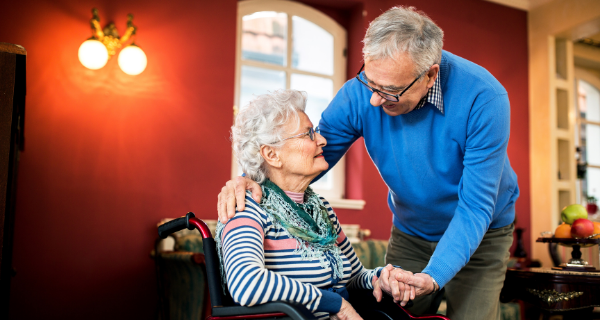While caregiving can be rewarding, it is important for caregivers to be aware how their physical and mental health might be affected. Unless you track the level of assistance you provide daily, you might be unaware of how much physical and emotional energy being a caregiver actually consumes.
For instance, your loved one probably needs help with a variety of tasks like preparing meals, laundry, grooming, and housekeeping. You may also need to manage their medications or finances, or drive them to appointments or plan their social activities. As your loved one’s disease progresses, the level of care they will require increases too – often leading to the caregiver experiencing exhaustion, loneliness, and even depression.
Whether it is skipping meals or skimping on sleep – many caregivers are quick to sacrifice caring for themselves. Recognize that not practicing good self-care can leave you feeling drained physically, mentally, and emotionally. More importantly, it will also limit your ability to provide the best care possible to your loved one.
How Caring for Someone with Alzheimer’s Affects Caregivers
Being aware of the physical, mental, and emotional effects you may experience as a caregiver will allow you to be proactive. It is important to recognize there are many positive aspects to caring for a loved one. In fact, according to the American Psychological Association, 83% of caregivers report positive feelings and experiences related to caregiving. This includes a personal satisfaction in providing excellent care to a loved one, and an increase in one’s personal growth, as well as a greater sense of purpose in life.
However, long-term caregiving for a loved one experiencing cognitive decline can also negatively impact the mental and physical health of the caregiver. Caregiver burnout refers to the state of physical, emotional, and mental exhaustion that caregivers reach when they don’t get the help they need or when they try to do more than they are able. This can lead to stress, anxiety, or depression, and result in a withdrawal from friends, relationships, and activities that bring you joy.
Signs that caring for someone with Alzheimer’s disease may be affecting your physical, mental, or emotional health include:
- Experiencing a loss of interest in hobbies and activities that used to bring you joy
- Feeling hopeless, irritated, and isolated
- Getting sick more often or having trouble sleeping (or are sleeping too much)
- Constantly in a state of emotional and physical exhaustion that makes you irritable
If you are experiencing any of these symptoms, it is a good idea to take a step back and focus on self-care. Don’t be afraid to consult a medical professional or therapist, who can offer resources and suggestions based on your particular situation.
How to Be a Healthier Caregiver
As a caregiver, it’s important to look after your own health, and to reach out for help when you need it. A survey of Alzheimer’s caregivers found that caregivers who reported the highest quality of life had the following in common:
- They felt that those they cared for were in good health
- They had independence from those they cared for
- They received additional help with caregiving
Those reporting a reduced quality of life were those who worried about the future and progression of their loved one’s illness, and who experienced extreme stress.
Here are some strategies for improving your physical and mental well-being:
- Ask for help. The best thing you can do for yourself and the person you care for is to ask for help from friends, family, and/or professionals. Look for ways to make life easier, like housekeeping and meal delivery services. You do not have to do this all on your own!
- Ensure that you make and attend regular medical appointments for yourself. When you speak with a medical professional, be sure that they know about your caregiving stress and responsibilities. They may be able to provide you with local resources or support groups that can help. Be as meticulous in caring for your own medical and needs as you are for those of your loved one.
- Get regular exercise. Exercise may be the last thing on your mind after a day of juggling your own work and caregiving responsibilities, but it’s one of the best things you can do for yourself. Even a quick walk around the block or taking the dog for a walk in the park can have a positive impact on your physical and mental health. If you’re unable to leave your loved one with someone else during this time, exercise at home on a treadmill or exercise bike.
- Eat a healthy, varied diet. It may be tempting to retreat into comfort foods or takeout at the end of a long day, but good nutrition fuels the body and the spirit. Lean meats, whole grains, and plenty of fruits and vegetables will give you the energy you need and help to keep your immune system strong.
- Understand that the progression of your loved one’s illness is out of your control. We all want our loved ones to have the best care possible. However, Alzheimer’s disease and other forms of dementia are progressive diseases, and despite the very best care you or a professional can provide, changes in their condition are going to occur. Plan ahead for the level of care they may need in the future, enjoy the good memories as you make them, and accept that you are doing your best to make each day the best it can possibly be for them.
More Alzheimer’s Care Resources
If you found this article helpful, we invite you to read these related resources including eight tips for defusing aggressive behaviors and some expert advice on managing common dementia care challenges.



